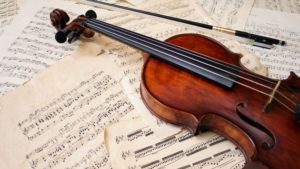 “Bach’s Goldberg Variations caused me misery – but I still can’t get enough”
“Bach’s Goldberg Variations caused me misery – but I still can’t get enough”
– Jeremy Denk, pianist
Our relationship with our repertoire is personal and often long-standing. Connections with certain pieces and composers may be forged in our early days of learning our instrument, which remain with us throughout our musical lives. Many of us can clearly remember some of the earliest pieces we learnt as children, and returning to repertoire learnt in childhood and during student years can bring an interesting, and sometimes uncomfortable rush of memories. Opening the score of the first book of Bach’s Well-Tempered Clavier, I saw my teacher’s markings, her explanation of the structure of a fugue, and for a moment I was transported back nearly 40 years to her living room and the big black Steinway grand piano on which she taught me.
Sometimes these repertoire relationships which are forged during early study can be detrimental to our learning as mature players. Bad habits from childhood and student days are deeply ingrained, and all too easily recalled, and thus very hard to shift later on. This is interesting in itself as it demonstrates how carefully (or not) one has learnt the music previously, and sometimes the only way to step aside from these habits is to buy a new score and start the music afresh, as if learning it for the very first time.
Jeremy Denk’s comment on the Goldberg Variations is interesting and will resonate with many musicians, I’m sure. We all have pieces which have a particular hold over us, which fascinate and compel us to revisit them over and over again. Yet their technical and musical complexities make the learning and practicing process difficult and sometimes less than rewarding. Some repertoire, however beautiful, satisfying or intriguing, is simply a slog, and the more progress one makes, the more “just out of reach” it seems.
Beethoven: Piano Sonata No. 32 in C Minor, Op. 111 – II. Arietta: Adagio molto semplice e cantabile
 Other works, in comparison, feel relatively easy, the music flows in practice and performance, gives satisfaction to player and audience, and enters into one’s personal catalogue of “favourites”.
Other works, in comparison, feel relatively easy, the music flows in practice and performance, gives satisfaction to player and audience, and enters into one’s personal catalogue of “favourites”.
However, “easy” can be a myth, because everything, even the simplest little prelude by Bach can be taken up a level each time we revisit the music. This setting aside of and returning to repertoire also affects our relationship with it, and we may observe how that relationship changes over time and due to artistic maturity. I have gone back to previously-learnt works and wondered what I found so difficult before. The passing of years and accumulated experience make the process of reviving repertoire stimulating and enjoyable. We are reminded of what attracted us to the music in the first place, while also continually finding new aspects to it. This curiosity also helps to keep alive our relationship with the repertoire.
Then there are pieces which we may never play, but, rather like the books you haven’t read, and may never read, remain special. Just knowing the score is there, on the bookshelf can foster a particular relationship with that music (I often buy scores of music I know I will never play simply for the pleasure of reading the music or admiring the organisation of it on the page), and maybe one day you will open it, set it on the music stand, and start the process of learning it.




